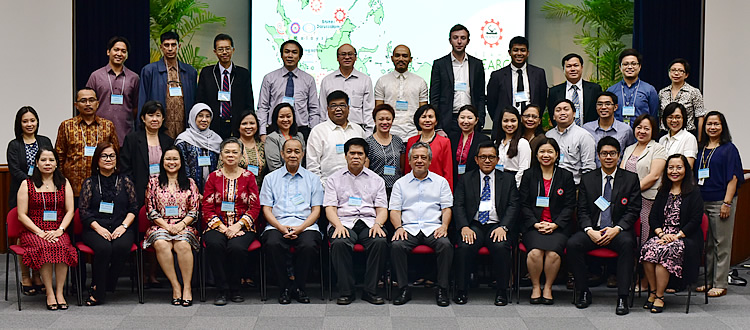CRPN is one of the projects under the SEAMEO College supported by the Asian Development Bank (ADB) and the Japan Fund for Poverty Reduction.
Considered a distinct and unique regional platform of education that departs from the typical collegial body, academy, or “brick and mortar” institution, the SEAMEO College promotes education innovation not just in terms of curricula, teaching and learning methods, and new educational technologies, but as a virtual college organized around education leaders, promoting and integrating “indigenous wisdom and talent” into the collective knowledge, expertise, and institutional resources of SEAMEO Centers. The SEAMEO College is animated by generative dialogues for accelerating learning and innovation on transboundary education human resources and development particular to the ASEAN Community.
Twenty-nine officials, department heads, and research and technical staff from 15 SEAMEO Centers and Network as well as from the SEAMEO Secretariat participated in the workshop and have gained knowledge on how to effectively respond to the needs of education ministers for policy research to address regional human resource development issues. Through the workshop, research priorities and programs were identified and aligned with SEAMEO’s seven priority areas, namely: 1) early childhood care and education, 2) addressing barriers to inclusion, 3) resiliency in the face of emergencies, 4) promoting technical and vocational education and training (TVET), 5) revitalizing teacher education, 6) promoting harmonization in higher education and research, and 7) adopting a 21st Century Curriculum. The workshop also facilitated discussion on the structure and functions of CPRN.
Outputs of the workshop will form part of a working paper on the establishment of the CPRN which will be presented to the Centers Directors Meeting in July 2016.
Dr. Serafin D. Talisayon served as the overall coordinator of the workshop while Dr. Roehlano M. Briones, Research Fellow at the Philippine Institute for Development Studies (PIDS) and Dr. Daylinda B. Cabanilla, Professor at the Department of Social Forestry and Forest Governance, University of the Philippines Los Baños served as resource persons. (Elmer G. Pandanan)
